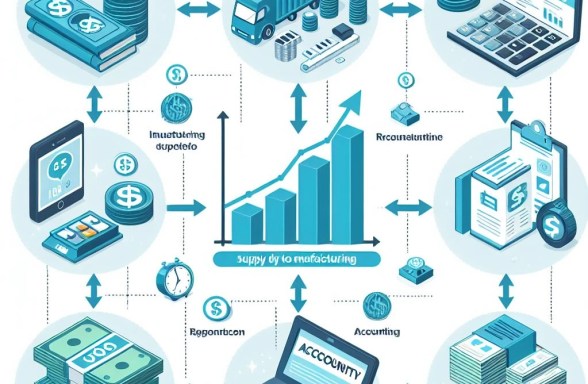Manufacturing and retail accounting encompasses the specialized financial processes and principles tailored to the unique needs of businesses operating in the manufacturing and retail sectors. It involves the systematic recording, analysis, and reporting of financial transactions related to production, distribution, sales, and inventory management. In manufacturing, accounting practices focus on cost control, inventory valuation, production efficiency, and regulatory compliance.
This includes tracking expenses such as raw materials, labor, and overhead costs to accurately calculate the cost of goods sold (COGS) and optimize profitability.

In retail, accounting processes revolve around sales revenue, inventory management, pricing strategies, and customer transactions. Retail accounting involves tracking sales, monitoring inventory levels, managing cash flow, and analyzing retail-specific metrics such as gross margin and inventory turnover.
Overall, manufacturing and retail accounting play a crucial role in providing businesses with financial insights, supporting decision-making, ensuring compliance with regulatory requirements, and optimizing operational efficiency to drive long-term success in these industries.
Manufacturing and retail accounting can have a profound positive impact on businesses across various aspects of operations, financial management, and strategic decision-making. Here are several ways in which manufacturing and retail accounting practices tailored to these industries can benefit businesses:
Benefits of Manufacturing and Retail Accounting
Financial Clarity and Transparency:
- Accurate accounting records provide businesses with a clear understanding of their financial position, including revenues, expenses, assets, and liabilities. This transparency enables stakeholders to assess the financial health of the business, make informed decisions, and plan for future growth and investment.
Cost Control and Profitability:
- By implementing robust cost accounting methods, businesses can analyze the costs associated with production, distribution, and sales. This insight allows for better cost control measures, identifying areas of inefficiency, and optimizing processes to enhance profitability.
Inventory Management Optimization:
- Manufacturing and retail accounting systems help businesses manage inventory effectively by tracking stock levels, valuing inventory accurately, and optimizing inventory turnover. This ensures that businesses maintain optimal inventory levels to meet customer demand while minimizing carrying costs and obsolescence risks.
Strategic Decision-Making:
- Accounting data provides valuable insights that drive strategic decision-making. Whether it’s assessing the feasibility of new product lines, evaluating the profitability of different sales channels, or analyzing market trends, accounting information serves as a foundation for informed business decisions.
Compliance and Risk Management:
- Manufacturing and retail businesses are subject to various regulatory requirements and accounting standards. By maintaining compliance with these regulations and standards, businesses mitigate legal risks, ensure financial transparency, and build trust with stakeholders such as investors, creditors, and regulatory authorities.
Tax Planning and Optimization:
- Accounting professionals assist businesses in tax planning strategies to minimize tax liabilities while remaining compliant with tax laws and regulations. By leveraging tax deductions, credits, and incentives, businesses can optimize their tax position and preserve cash flow for reinvestment and growth.
Enhanced Operational Efficiency:
- Efficient accounting systems streamline financial processes, automate routine tasks, and reduce manual errors, saving time and resources. This efficiency extends beyond finance departments, benefiting overall operational performance and enabling businesses to focus on core activities and value-added initiatives.
Improved Cash Flow Management:
- Accurate cash flow forecasting and management are essential for sustaining business operations and fueling growth. Manufacturing and retail accounting systems help businesses monitor cash inflows and outflows, identify cash flow trends, and implement strategies to optimize working capital and liquidity.
Also Check: What do you look for in a Plumbing service?
Final Words:
In summary, manufacturing and retail accounting positively affect businesses by providing financial clarity, enabling cost control and profitability, optimizing inventory management, supporting strategic decision-making, ensuring compliance and risk management, facilitating tax planning, enhancing operational efficiency, and improving cash flow management.
By leveraging accounting practices tailored to their specific needs, businesses can achieve greater financial stability, sustainability, and success in today’s competitive marketplace.
Tags: Manufacturing and retail accounting pdf, accounting for manufacturing company pdf, Manufacturing and retail accounting bookkeeping, manufacturing accounting examples, manufacturing accounting entries, accounting for retail business pdf, manufacturing accounting process flow, manufacturing accounting books.
